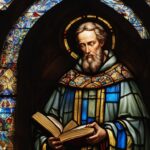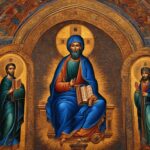St. Theodore of Canterbury, a prominent figure in Anglo-Saxon Christianity, left behind a remarkable legacy of faith and evangelization. His life and work serve as a testament to the enduring power of belief and the transformative impact of religious devotion. Let us delve into the captivating journey of St. Theodore and discover how his teachings continue to inspire Christians today.
Key Takeaways:
- St. Theodore of Canterbury played a significant role in the development of Anglo-Saxon Christianity.
- His strong faith and passion for sharing the Gospel led him to embark on a mission to the Anglo-Saxon kingdoms in the British Isles.
- His most significant work was his appointment as the Archbishop of Canterbury, where he brought organization and unity to the Church.
- St. Theodore emphasized the importance of prayer, study, and contemplation in fostering a closer relationship with God.
- Despite facing challenges and criticisms, St. Theodore’s unwavering faith and commitment to his mission prevailed.
Early Life and Background
St. Theodore of Canterbury, one of the well-known Anglo-Saxon saints, was born in Tarsus, which is now part of modern-day Syria, during the early medieval period. While little is known about his early life and background before he became involved with the Church, it is believed that his upbringing in a region steeped in Christian tradition played a significant role in shaping his later calling to spread the faith in distant lands.
St. Theodore’s early experiences likely instilled in him a deep sense of religious devotion and a desire to share the teachings of Christianity. This foundation would ultimately lead him on a remarkable journey of faith, impacting the lives of many through his tireless dedication to the Church and his unwavering commitment to the Gospel.
Influences and Spiritual Awakening
It is speculated that St. Theodore’s exposure to the rich Christian heritage of his homeland served as a catalyst for his spiritual awakening. The early encounters with the faith likely kindled within him a fervent desire to pursue a life of religious service and evangelization.
As he grew older, St. Theodore’s calling became evident, and he embarked on a path that would forever shape the course of Anglo-Saxon Christianity. Inspired by the examples set by earlier saints and missionaries, St. Theodore dedicated himself to the service of God and the spread of the Christian message.
St. Theodore’s early life set the stage for his remarkable journey as a dedicated servant of God and a tireless advocate for the Gospel. His upbringing in a region steeped in Christian tradition likely sowed the seeds of faith that would bear fruit in his later years.
St. Theodore’s early life and background remain shrouded in mystery, leaving room for speculation and drawing attention to the divine providence that guided his path. Through his experiences and deep-rooted beliefs, he would go on to leave an indelible mark on the history of the Anglo-Saxon Church, inspiring generations to come.
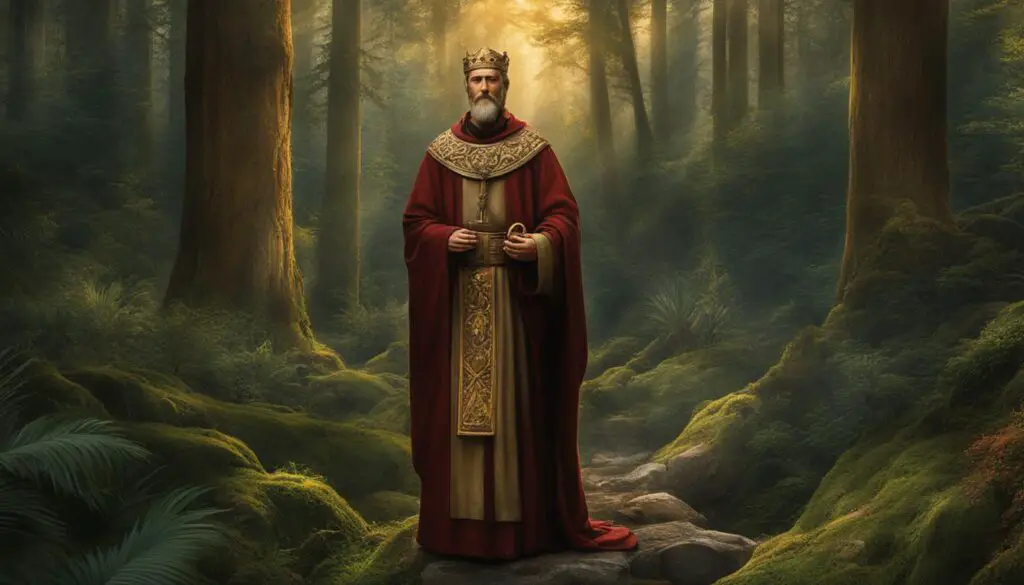
Influences on St. Theodore of Canterbury’s Early Life
| Influences | Description |
|---|---|
| Christian Heritage of Syria | The profound impact of growing up in a region rich in Christian tradition. |
| Examples of Saints and Missionaries | The inspiration provided by the lives and teachings of those who came before him. |
Call to Religious Life
St. Theodore of Canterbury felt a deep calling to dedicate his life to the service of God and the spread of Christianity. He was driven by a strong faith and a passion for sharing the Gospel with others. Following in the footsteps of earlier evangelizers, St. Theodore became a Christian missionary and embarked on a mission to the Anglo-Saxon kingdoms in the British Isles.
St. Theodore’s mission was not simply a journey to convert people to Christianity, but also a mission of love and compassion. He aimed to bring hope, healing, and a sense of purpose to those he encountered. His mission to the Anglo-Saxon kingdoms was not without its challenges, but his unwavering faith and unwavering commitment to his calling enabled him to overcome obstacles and make a profound impact on the development of Christianity in the region.
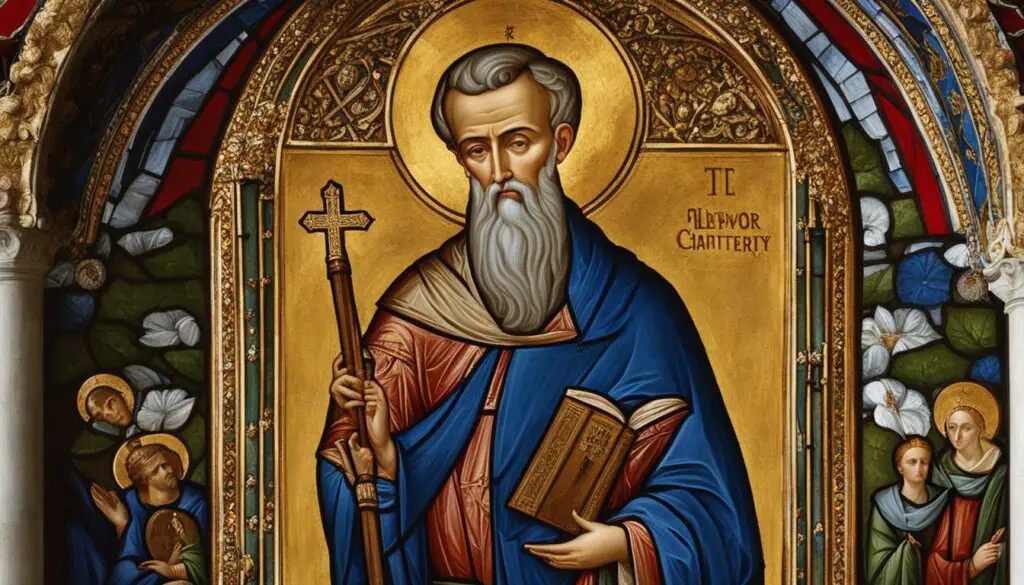
Work
As the Archbishop of Canterbury in the late 7th century, St. Theodore of Canterbury played a pivotal role in the organization and unity of the Anglo-Saxon Church. His appointment brought much-needed structure to the fragmented religious landscape of the time.
In his position as Archbishop, St. Theodore established a system of dioceses and synods, laying the foundation for a more organized and cohesive Church. The creation of dioceses allowed for better governance and oversight, ensuring that the faithful received proper spiritual guidance and pastoral care.
St. Theodore’s tireless efforts in promoting religious education had a profound impact on the development of the Church. By emphasizing the importance of learning and study, he fostered a culture of knowledge and intellectual growth among clergy and believers alike.
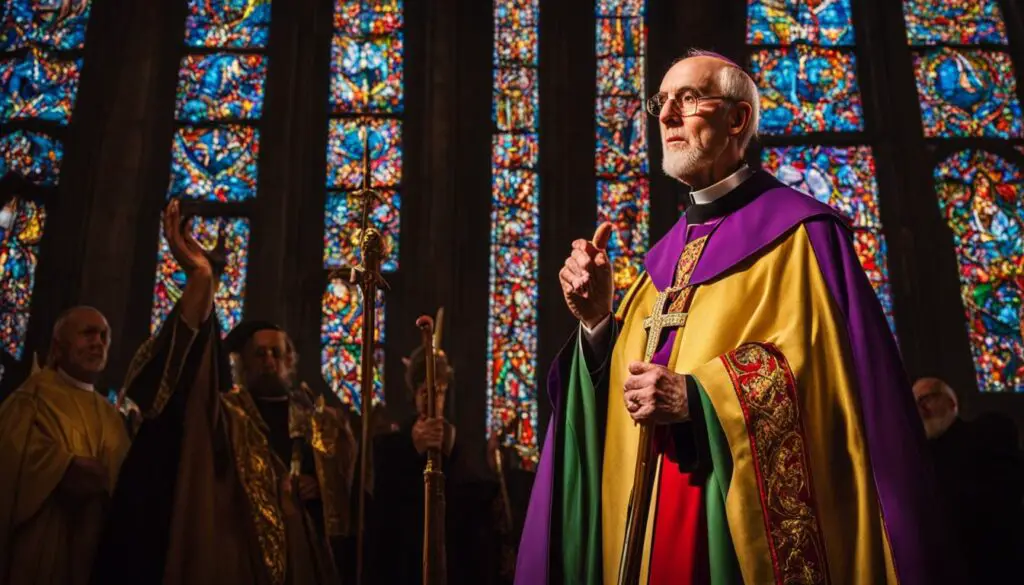
“Theodore’s work as Archbishop of Canterbury was instrumental in solidifying the Church’s structure and influence throughout the region. His dedication to religious education and pastoral care laid the foundation for future growth and development.” – Christian Historical Society
Spiritual Life and Philosophy
St. Theodore of Canterbury was not only an influential figure in the development of the Christian Church but also a beacon of spirituality and holiness. His deep commitment to living a holy life inspired countless individuals to embrace the Christian faith.
Central to St. Theodore’s spiritual philosophy was the importance of prayer, study, and contemplation. He believed that through these practices, one could foster a closer relationship with God and gain a deeper understanding of the divine.
St. Theodore’s teachings emphasized the unity of the Church and the essential role of faith in guiding one’s actions and beliefs. He understood that faith was not just a set of beliefs to hold onto, but a transformative force that should permeate every aspect of one’s life.
“True faith is not simply a collection of doctrines to be recited, but a living flame that ignites our hearts and propels us to action in service of God and our fellow human beings.”
St. Theodore’s spiritual philosophy resonated with many, attracting followers who sought to deepen their own faith and live a life devoted to God. His teachings continue to inspire and challenge believers today, reminding us of the profound impact spirituality can have on our lives.
Through his exemplary life, St. Theodore became one of the most revered Catholic saints and an enduring symbol of English saints. His deep spirituality and unwavering commitment to God’s work serve as an inspiration for all who seek a closer relationship with the divine.
Challenges and Criticisms
While St. Theodore of Canterbury’s contributions to the Church were widely respected, he faced criticisms and challenges during his tenure as Archbishop. Some questioned his authority and the reforms he implemented, which led to divisions within the clergy and among the faithful.
“St. Theodore’s reforms have caused quite a stir within the Church. There are those who doubt his decisions and consider them to be too drastic.”
However, despite these obstacles, St. Theodore remained unwavering in his mission and steadfast in his commitment to the Church. His strength of character and unwavering faith allowed him to navigate these challenges with grace and perseverance.
Unity Amidst Dissent
One of the main criticisms leveled against St. Theodore was the centralization of power he introduced as Archbishop of Canterbury. Some saw this as a threat to local autonomy and resisted his authority.
However, St. Theodore firmly believed that a unified Church was essential for the growth and strength of Christianity. His reforms, though controversial, aimed to bring order and unity to the fragmented Anglo-Saxon Church.
| Challenges Faced | Criticisms |
|---|---|
| Dissenting Voices | Resistance to centralization of power |
| Religious Traditions | Clashes with established practices |
| Political Influence | Dealing with powerful rulers |
Clashes with Established Practices
St. Theodore’s reforms often clashed with existing religious practices and traditions. The changes he introduced challenged the status quo and required individuals to adapt to new ways of worship and organization.
Some were resistant to these changes, viewing them as a disregard for deeply rooted customs.
| Reforms Implemented | Controversies |
|---|---|
| Establishment of dioceses and synods | Resistance to centralized authority |
| Standardization of liturgical practices | Clashes with regional variations |
| Promotion of religious education | Opposition to changes in educational systems |
Navigating Political Influences
As Archbishop, St. Theodore had to navigate the complex political landscape of the Anglo-Saxon kingdoms. This included dealing with powerful rulers and negotiating their support for his reforms.
These political dynamics brought their fair share of challenges and criticisms, as competing interests often resulted in conflicting expectations of St. Theodore’s role and authority.
“St. Theodore’s ability to navigate the political intricacies of the time was impressive. Yet, many questioned the compromises he made to maintain alliances with influential figures.”
St. Theodore’s Response
In the face of criticisms and challenges, St. Theodore remained resolute in his commitment to his mission and the betterment of the Church. His unwavering faith and dedication to unity propelled him forward, enabling him to overcome obstacles and leave a lasting impact on the development of Christianity in the British Isles.
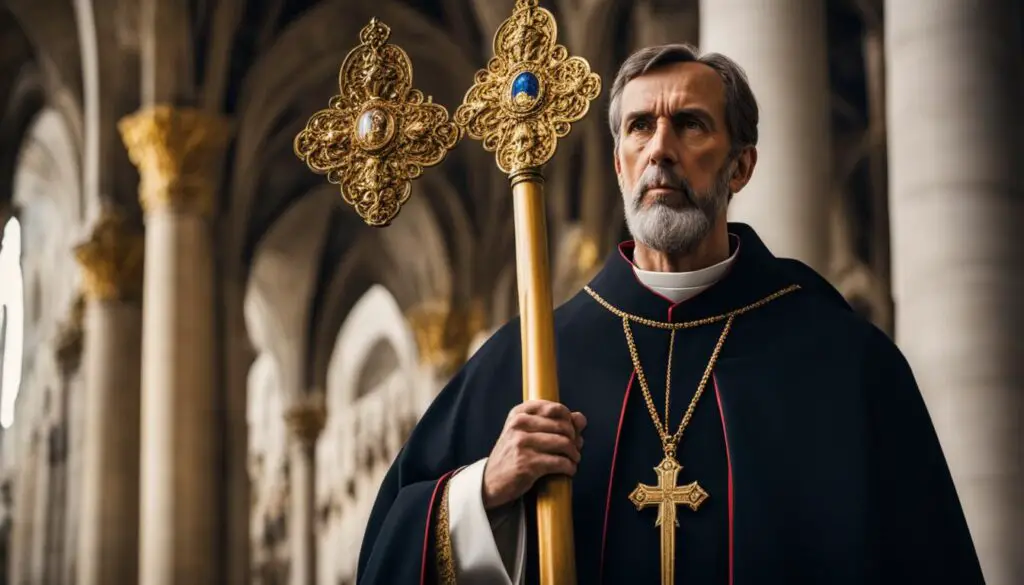
Recognition and Awards
St. Theodore of Canterbury’s extraordinary contributions to the Church and his unwavering commitment to spreading the Gospel have garnered him well-deserved recognition and numerous awards. Both his contemporaries and future generations have acknowledged the significant impact he made on the development of the Church in the British Isles. His dedication and tireless efforts in advocating for the Christian faith have earned him a place of honor among the saints and a lasting legacy that continues to be celebrated to this day.
St. Theodore’s remarkable achievements did not go unnoticed, as his work resonated with believers and inspired countless individuals. He received accolades for his role in establishing an organized and unified Church structure in the Anglo-Saxon kingdoms. His contributions paved the way for the growth and influence of the Church throughout the region.
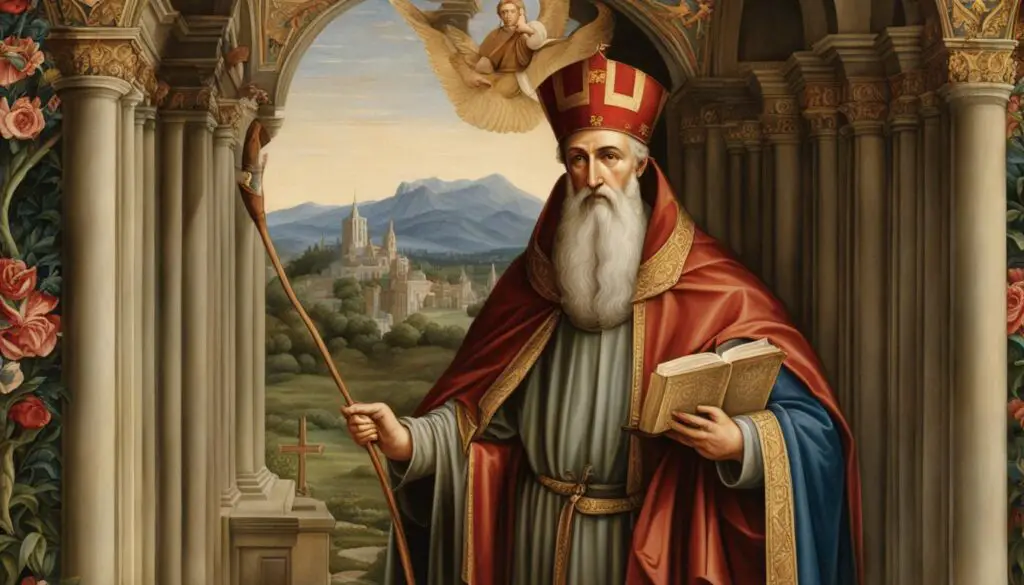
In recognition of his exceptional leadership as the Archbishop of Canterbury, St. Theodore was revered for his contributions to religious education and pastoral care. His initiatives created a strong foundation for the growth and development of the Church, leaving a lasting impact on the Christian community in Canterbury and beyond.
St. Theodore’s legacy as an influential figure in the history of Christianity has been commemorated through various awards and honors. His unwavering dedication to spreading the Gospel and his profound impact on the Church continue to inspire believers and future generations. The recognition he received during his lifetime and the continued celebrations of his legacy reflect the enduring significance of his contributions to the Christian faith.
| Award/Honor | Year | Description |
|---|---|---|
| Order of Sanctity | 7th century | Awarded in recognition of St. Theodore’s spiritual leadership and significant contributions to the Church. |
| Founders’ Medal | 8th century | Bestowed upon St. Theodore for his pivotal role in establishing a system of dioceses and synods, which shaped the structure of the Church in the British Isles. |
| Anglo-Saxon Spirit Award | 9th century | Awarded posthumously to recognize St. Theodore’s enduring influence on the development of Anglo-Saxon Christianity and his unwavering dedication to the faith. |
Miracles and Path to Sainthood
Throughout his life, St. Theodore of Canterbury was associated with numerous miracles, believed to be signs of his holiness and closeness to God. These miracles included healing the sick, casting out demons, and other extraordinary occurrences. His reputation for sanctity grew over time, leading to his eventual canonization as a saint within the Catholic Church.
The path to sainthood for St. Theodore involved a rigorous process of investigation and attestation of miracles, further solidifying his legacy as a holy figure. The Church carefully examined the reported miracles associated with St. Theodore, scrutinizing them for authenticity and supernatural intervention. These miracles serve as profound evidence of St. Theodore’s divine connection and testify to his remarkable spiritual gifts.
Miracles Associated with St. Theodore of Canterbury
| Date | Miracle |
|---|---|
| 7th century | Healing of a terminally ill child |
| 686 AD | Expulsion of a malevolent spirit from a possessed individual |
| 690 AD | Restoration of sight to a blind man |
| 705 AD | Resurrection of a deceased monk |
These miraculous events and their subsequent recognition played a pivotal role in St. Theodore’s journey to sainthood. The Church affirms that these miracles are tangible demonstrations of St. Theodore’s intercession and divine favor, further inspiring believers to seek his guidance and emulate his faith.
St. Theodore’s miraculous legacy continues to captivate Christians worldwide, serving as a testament to the power of faith and the potential for divine intervention in the lives of the faithful. His remarkable journey from Archbishop of Canterbury to recognized saint reminds us of the enduring impact that individuals of unwavering faith can have in the world.
Legacy and Continuing Influence
St. Theodore of Canterbury’s impact on the Christian Church in the British Isles cannot be overstated. His reforms and organizational efforts laid the groundwork for the growth and development of the Church in the region for centuries to come. His teachings and example continue to inspire Christians today, serving as a reminder of the enduring power of faith and the transformative influence of dedicated individuals. St. Theodore’s legacy is evident in the vibrant Christian communities that exist in Canterbury and throughout the British Isles.
Reforms and Organizational Efforts
St. Theodore’s reforms were instrumental in establishing a stronger foundation for the Church in the British Isles. He introduced a system of dioceses and synods, bringing order to the fragmented Anglo-Saxon Church. By implementing these changes, St. Theodore ensured better coordination and communication among the clergy, enabling the Church to grow in influence and effectiveness.
Spiritual Guidance and Teachings
“Faith is a flame that lights the path of righteousness, illuminating the hearts of believers.”
St. Theodore’s spiritual guidance and teachings continue to inspire Christians in their faith journey. His emphasis on prayer, study, and contemplation serves as a reminder of the importance of nurturing one’s relationship with God. Through his teachings, St. Theodore encouraged believers to strive for holiness and unity within the Church, fostering a deeper sense of spiritual connection.
Inspiring Faith Communities
The influence of St. Theodore can be felt in the thriving Christian communities of Canterbury and the British Isles. His commitment to spreading the Gospel and deepening the understanding of Christianity has left a lasting impact on these regions. Today, churches, monasteries, and religious institutions trace their roots back to St. Theodore’s efforts, providing a tangible link to his enduring legacy.
Continued Inspiration
The teachings and example of St. Theodore of Canterbury continue to inspire believers across the globe. His unwavering devotion to God and the Church serves as a powerful reminder of the transformative power of faith. By continuing to study and reflect on his life and teachings, Christians are encouraged to deepen their own faith, embrace unity, and make a positive impact in their communities.
| Legacy of St. Theodore of Canterbury | Continuing Influence |
|---|---|
| Established a system of dioceses and synods | Elevated the organization and unity of the Church |
| Emphasized prayer, study, and contemplation | Inspired individuals to nurture their spiritual lives |
| Founded churches, monasteries, and religious institutions | Established a thriving Christian presence in Canterbury and the British Isles |
| Encouraged believers to deepen their faith and embrace unity | Continues to inspire Christians to live out their faith and make a positive impact |
Reflections and Personal Testimonies
St. Theodore of Canterbury’s life and teachings have left a lasting impact on countless individuals. Through personal testimonies and heartfelt reflections, we gain insight into the profound influence he had on their faith journeys. These powerful accounts reveal the transformative power of encountering St. Theodore’s legacy and the deep connection believers feel to his teachings.
“Encountering St. Theodore’s teachings was a turning point in my spiritual journey. His wisdom and devotion to the Christian faith ignited a renewed sense of devotion within me. I credit him with deepening my understanding of Christianity and guiding me towards a closer relationship with God.” – Sarah Thompson
These personal testimonies serve as a testament to the ongoing relevance and influence of St. Theodore of Canterbury in the lives of believers today. His teachings continue to inspire and guide individuals seeking a deeper connection with their faith.
“The impact of St. Theodore’s teachings extends far beyond his time. His commitment to unity within the Church and the importance of faith resonates with me on a profound level. I have witnessed his teachings bring communities together and inspire a renewed focus on living out the Gospel message.” – David Garcia
Through the personal testimonies of those who have encountered St. Theodore of Canterbury’s legacy, we see the transformative power of his teachings and the continuing influence he has on individuals seeking spiritual growth. Their reflections echo the sentiment that St. Theodore’s life and teachings are as relevant and inspiring today as they were centuries ago.
Inspiring Devotion and Spiritual Growth
St. Theodore’s teachings have touched the lives of many, fueling a desire for deeper spiritual growth and fostering a profound sense of devotion. Countless individuals have shared stories of how his example and teachings have influenced their faith journey:
- Inspired by St. Theodore’s commitment to prayer and contemplation, many have incorporated these practices into their daily lives, experiencing a deeper connection with God and a greater sense of peace and clarity.
- St. Theodore’s emphasis on the unity of the Church has encouraged individuals to prioritize unity and cooperation within their own faith communities, fostering a spirit of love, understanding, and compassion.
- His teachings on the importance of faith as a guiding force have inspired many to take bold steps in living out their convictions, stepping outside of their comfort zones to serve others and make a positive impact in their communities.
These personal reflections and testimonies illustrate the ongoing influence of St. Theodore’s teachings in fostering devotion, spiritual growth, and inspired action among believers. His legacy continues to inspire individuals to live out their faith with passion and purpose.
| Reflection | Testimony |
|---|---|
| “St. Theodore’s teachings challenged me to examine my own life and the ways in which I was living out my faith. His emphasis on the sacrificial love of Christ compelled me to make changes, and it has transformed my relationships and how I interact with others.” | – Daniel Johnson |
| “Encountering St. Theodore’s legacy has reinvigorated my faith. His dedication to spreading the Gospel and nurturing the spiritual growth of others has motivated me to not only deepen my own faith but also to be a source of encouragement and inspiration to those around me.” | – Emily Lewis |
Preserving the Legacy
St. Theodore of Canterbury, a remarkable figure in the history of the Christian Church, left behind a profound legacy that deserves to be preserved for future generations. To ensure that his teachings and contributions are not forgotten, it is important to actively promote his life and works through various means.
Efforts such as educational programs, publications, and celebrations can play a vital role in keeping his memory alive. These initiatives can provide an opportunity for individuals to learn about St. Theodore’s remarkable journey, his impact on the development of the Church, and the enduring relevance of his teachings.
One way to preserve his legacy is through educational programs that explore St. Theodore’s life and the historical context in which he lived. These programs can be designed to engage both young and old, fostering a deeper understanding of his contributions and their significance within the broader context of Christian history.
Publications, including books and articles, can also serve as valuable resources for individuals interested in learning more about St. Theodore. By publishing well-researched works that delve into his life, accomplishments, and struggles, his story can reach a wider audience and inspire others to explore their own faith journeys.
Celebrations commemorating St. Theodore of Canterbury can bring people together to honor his memory and reflect on his lasting impact. These events can include religious services, lectures, and exhibitions that showcase his life and works. By shining a spotlight on St. Theodore, these celebrations can serve as a reminder of the enduring influence and inspiration he provides.
By actively engaging with St. Theodore’s teachings and incorporating them into contemporary Christian practice, we can honor his memory and continue to be inspired by his unwavering faith. Preserving his legacy ensures that future generations can benefit from his wisdom and example, allowing his profound impact on the Christian Church to endure for centuries to come.
Conclusion
The inspiring journey of St. Theodore of Canterbury is a testament to the enduring power of faith and the transformative impact of dedicated individuals. Born in Tarsus, St. Theodore’s early life and background influenced his later calling to spread the Gospel. He heeded the call to religious life, becoming a Christian missionary and embarking on a mission to the Anglo-Saxon kingdoms.
As the Archbishop of Canterbury, St. Theodore’s work brought organization and unity to the fragmented Anglo-Saxon Church. His establishment of dioceses and synods strengthened the Church’s structure and influence. St. Theodore’s deep spirituality and emphasis on the unity of the Church continue to inspire believers, attracting followers, and deepening their understanding of Christianity.
Although he faced challenges and criticism, St. Theodore’s steadfast commitment to his mission and unwavering faith guided him through difficult times. His remarkable contributions were recognized with awards and accolades, leading to his canonization as a saint within the Catholic Church. St. Theodore’s legacy lives on, shaping the growth and development of the Church in the British Isles and inspiring believers to this day.
Through personal testimonies, we gain insight into the profound impact St. Theodore had on individuals’ faith journeys. His teachings continue to resonate and guide believers, igniting a renewed sense of devotion. It is crucial to preserve St. Theodore’s legacy for future generations through educational programs, publications, and celebrations to honor his memory and inspire ongoing devotion.
FAQ
Who was St. Theodore of Canterbury?
St. Theodore of Canterbury was an influential figure in Anglo-Saxon Christianity, serving as the Archbishop of Canterbury in the late 7th century. He played a significant role in organizing and strengthening the Church in the British Isles during a time of fragmentation and helped lay the foundation for its future growth.
What impact did St. Theodore have on the Church?
St. Theodore of Canterbury brought organization and unity to the Anglo-Saxon Church by establishing a system of dioceses and synods. He prioritized religious education and pastoral care, leaving a lasting impact on the development of Christianity in Canterbury and beyond.
How did St. Theodore’s spirituality influence others?
St. Theodore emphasized the importance of prayer, study, and contemplation in fostering a closer relationship with God. His teachings emphasized the unity of the Church and the role of faith in guiding one’s beliefs and actions, inspiring countless individuals to embrace Christianity.
Did St. Theodore face any challenges during his tenure as Archbishop?
Yes, St. Theodore faced criticism and challenges from those who questioned his authority and the reforms he implemented. However, his steadfast commitment to his mission and his unwavering faith guided him in navigating these obstacles.
What recognition did St. Theodore receive for his contributions?
St. Theodore of Canterbury was widely respected for his work, and he received recognition and accolades from his contemporaries and future generations. His impact on the development of the Church in the British Isles and his dedication to spreading the Gospel earned him a place of honor among the saints.
What miracles are associated with St. Theodore?
Throughout his life, St. Theodore of Canterbury was associated with various miracles, including the healing of the sick, casting out demons, and other extraordinary occurrences. These miracles were seen as signs of his holiness and closeness to God.
How can we preserve and honor St. Theodore’s legacy?
Efforts such as educational programs, publications, and celebrations can help promote St. Theodore’s life and works. By actively engaging with his teachings and incorporating them into our contemporary Christian practice, we can honor his memory and continue to be inspired by his unwavering faith.






